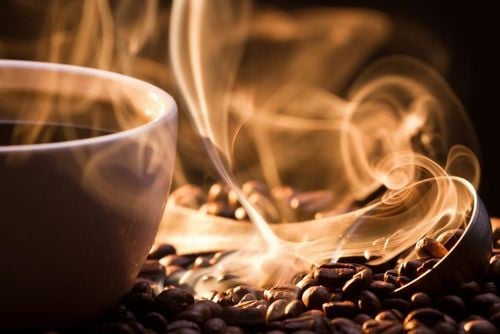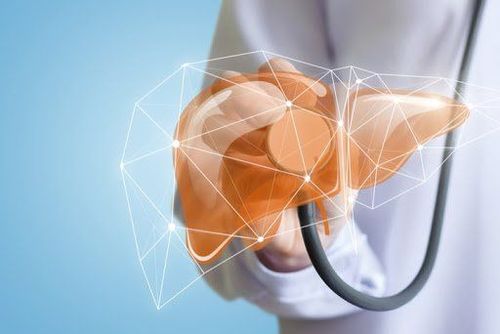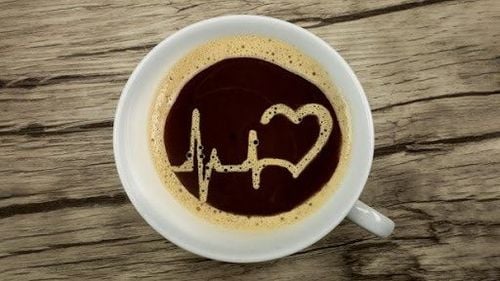This is an automatically translated article.
Currently, foods and beverages containing caffeine are very popular and diverse on the market. Caffeine is a natural stimulant, however some studies suggest that caffeine inhibits the absorption of iron - an important nutrient element for the human body. For iron supplementation to be effective, let's learn how coffee inhibits iron absorption and foods inhibit iron absorption.
1. Is caffeine the reason that coffee inhibits iron absorption?
Some studies have shown coffee and other caffeinated beverages can reduce iron absorption. For example. Drinking a cup of coffee while eating a hamburger can reduce iron absorption by up to 39%. Or when you drink a cup of instant coffee with a piece of bread, it inhibits iron absorption by 60–90%.
In addition to coffee, tea is also believed to be an iron absorption inhibitor. Drinking a cup of tea with a meal will inhibit iron absorption by 64%. Moreover, the stronger the coffee or tea, the higher the caffeine content, the less iron the body absorbs. In addition to inhibiting iron absorption when consuming foods containing caffeine and iron simultaneously, studies have shown that: Drinking coffee regularly can also affect iron stores in the body.
However, the inhibitory effect of coffee and caffeine on iron absorption depends on when you drink coffee. For example, drinking coffee an hour before a meal does not affect the absorption of iron from food.
2. Is caffeine the only reason that coffee inhibits iron absorption?
However, studies show that caffeine isn't the only reason why coffee inhibits iron absorption. In fact, researchers have shown that caffeine itself only binds to about 6% of dietary iron. This is a relatively small percentage compared to the effect of coffee on iron absorption. Therefore, many studies are conducted to find out other factors in coffee that can inhibit iron absorption. As a result, scientists have found polyphenols in coffee and tea that have the ability to inhibit iron absorption by up to 90%. Common polyphenols include: Chlorogenic acid in coffee, cocoa and some herbs; Tannins found in black tea coffee. Similar to caffeine, these substances bind to iron during digestion, making it available in a form that is difficult to absorb.
The ability of caffeine and polyphenols to inhibit iron absorption is dose dependent. That is, the higher the polyphenol content in the food. In one study, beverages containing 20–50 mg of polyphenols per serving inhibited iron absorption from meals by 50–70%. Meanwhile, beverages containing 100-400 mg of polyphenols per serving inhibit iron absorption from food by 60–90%. In another study, consuming 5 mg of tannin with a meal inhibited iron absorption by 20%, while 25 mg of tannin inhibited iron absorption by 67% and 100 mg of tannin inhibited iron absorption by 88%.

Một số nghiên cứu đã chỉ ra cà phê và các đồ uống có chứa caffein khác có thể làm giảm sự hấp thụ sắt
3. How does coffee affect the absorption of iron of plant and animal origin?
Iron absorption is complex and influenced by many different factors. Studies have shown that the type of iron absorption inhibition by coffee also varies depending on the food used to supplement the body's iron.
Iron in food has h2 forms as heme iron and non-heme iron. Heme iron is often found in foods of animal origin such as meat, poultry, and seafood. In contrast, non-heme iron is mainly found in plant-based foods and is relatively unstable. The body absorbs 15-35% better heme iron, while only 2% to 20% of non-heme iron is absorbed under optimal conditions. This is because heme iron is absorbed intact and is not affected by other factors in the diet.
The results of evaluating the inhibitory effect of caffeine on iron absorption on two forms of iron showed that: coffee and caffeinated beverages have little effect on the absorption of heme iron but have the ability to inhibit iron absorption. heme is relatively strong.
4. What to do to limit the inhibition of iron absorption?
Although coffee in general and caffeine in particular have the effect of inhibiting iron absorption. However, many studies show that coffee and caffeine do not lead to iron deficiency in healthy people. However, people at risk of iron deficiency should not drink a lot of coffee and tea to ensure the body absorbs iron effectively through nutritional supplements with daily food.
Population groups at risk of iron deficiency include: Women of childbearing age, infants and young children, people with restricted diets, nutrient deficiencies such as vegetarians and people with a medical condition. digestive diseases such as inflammatory bowel disease. Here are useful tips from experts for subjects to limit the inhibition of iron absorption by coffee and caffeinated beverages:
If drinking coffee or tea, drink in between meals and at least one hour after eating; Increase foods containing heme iron through meat, poultry or seafood; Supplement with vitamin C to increase iron absorption; Use calcium-rich foods and fiber-rich foods like whole grains separately, away from the timing of iron-rich foods.
Please dial HOTLINE for more information or register for an appointment HERE. Download MyVinmec app to make appointments faster and to manage your bookings easily.
References: pubmed.ncbi.nlm.nih.gov, healthline.com












